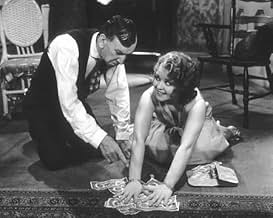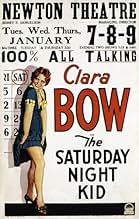Mayme and sister Janie are salesgirls in Ginsberg's Department Store. Mayme is in love with store clerk Bill, but Janie tries to steal him from her. Hazel, another salesgirl, is Jean Harlow'... Read allMayme and sister Janie are salesgirls in Ginsberg's Department Store. Mayme is in love with store clerk Bill, but Janie tries to steal him from her. Hazel, another salesgirl, is Jean Harlow's first credited role.Mayme and sister Janie are salesgirls in Ginsberg's Department Store. Mayme is in love with store clerk Bill, but Janie tries to steal him from her. Hazel, another salesgirl, is Jean Harlow's first credited role.
Alice Adair
- Girl
- (uncredited)
Ernie Adams
- Gambler
- (uncredited)
Irving Bacon
- McGonigle
- (uncredited)
Getty Bird
- Riche Ginsberg
- (uncredited)
Eddie Dunn
- Jim
- (uncredited)
Bess Flowers
- Customer
- (uncredited)
Mary Gordon
- Reducing Customer
- (uncredited)
Jean Harlow
- Hazel
- (uncredited)
Leone Lane
- Pearl
- (uncredited)
Frank Ross
- Ken
- (uncredited)
Featured review
Clara Bow and Jean Arthur both started starring in movies around 1924. Bow was 19 and Arthur was 24. In 1927, Bow reached super-stardom as the "It" girl in "It" and playing in first Academy Award Winning movie "Wings." So, now two years later you have superstar Bow, age 24 and star Arthur age 29 playing sisters.
Oddly, Arthur seems to be playing the younger sister. In the opening scene, Bow brazenly pulls up Arthur's dress and reveals Arthur's underwear for the camera. She accuses her sister of stealing her "step-ins". It establishes Clara as the dominant personality.
Later, there's a wonderful scene where both are in their underwear about to go to bed. Arthur has just stolen Bow's boyfriend. Bow prays, while Arthur hops into bed. She moans innocently, "I can't help it if he like me more than you." Bow snaps back, "Shut up, I'm saying my prayers." Bow is strong and gives a great performance, but its Arthur with a thin, almost squeaky, voice who steals every scene.
The movie moves briskly with nice scenes in a department store, on the street and on an apartment porch beneath what could be the Brooklyn Bridge.
Nice comic support is given by Edna Mae Oliver who plays a store manager putting on a pageant for Goldberg's, the store where the sisters work. In the play that she puts on, she casts Arthur as virtue and Bow as pleasure to show the triumph of virtue over pleasure. This is ironic as in the movie, they are playing the opposite roles.
Charles Sellon, the unforgettable Mr. Muckle in W.C. Fields "Its a Gift," also gives a great performance. He's gambler-neighbor who cons Arthur to give him money by reassuring her, "With me its not a gamble, but an investment." Bow would go on to make eight more films over the next four years and then quit movies forever in 1933 at the age of 28. On the other hand, Jean Arthur continued starring for twenty more years in classics like "Mr. Deeds Goes to Town," and "Mr. Smith Goes to Washington".
Some people will be disappointed because the film is pretty light weight. It is barely over an hour and basically climaxes just when it is getting most interesting. Still, watching Bow at the top of her game and Arthur rising to match her is delightful.
Oddly, Arthur seems to be playing the younger sister. In the opening scene, Bow brazenly pulls up Arthur's dress and reveals Arthur's underwear for the camera. She accuses her sister of stealing her "step-ins". It establishes Clara as the dominant personality.
Later, there's a wonderful scene where both are in their underwear about to go to bed. Arthur has just stolen Bow's boyfriend. Bow prays, while Arthur hops into bed. She moans innocently, "I can't help it if he like me more than you." Bow snaps back, "Shut up, I'm saying my prayers." Bow is strong and gives a great performance, but its Arthur with a thin, almost squeaky, voice who steals every scene.
The movie moves briskly with nice scenes in a department store, on the street and on an apartment porch beneath what could be the Brooklyn Bridge.
Nice comic support is given by Edna Mae Oliver who plays a store manager putting on a pageant for Goldberg's, the store where the sisters work. In the play that she puts on, she casts Arthur as virtue and Bow as pleasure to show the triumph of virtue over pleasure. This is ironic as in the movie, they are playing the opposite roles.
Charles Sellon, the unforgettable Mr. Muckle in W.C. Fields "Its a Gift," also gives a great performance. He's gambler-neighbor who cons Arthur to give him money by reassuring her, "With me its not a gamble, but an investment." Bow would go on to make eight more films over the next four years and then quit movies forever in 1933 at the age of 28. On the other hand, Jean Arthur continued starring for twenty more years in classics like "Mr. Deeds Goes to Town," and "Mr. Smith Goes to Washington".
Some people will be disappointed because the film is pretty light weight. It is barely over an hour and basically climaxes just when it is getting most interesting. Still, watching Bow at the top of her game and Arthur rising to match her is delightful.
- jayraskin1
- Aug 4, 2016
- Permalink
Storyline
Did you know
- TriviaThe dress that Jean Harlow wears in the pageant scene was intended for 'Clara Bow', but Bow had gained too much weight to fit into it, so she convinced designer Edith Head to let the unknown actress to wear it. Harlow never forgot the favor.
- Alternate versionsA silent version was released released simultaniously, with titles by Joseph L. Mankiewicz, for theaters that were not yet equipped for sound.
- ConnectionsFeatured in Hollywood (1980)
Details
- Runtime1 hour 3 minutes
- Color
Contribute to this page
Suggest an edit or add missing content





































